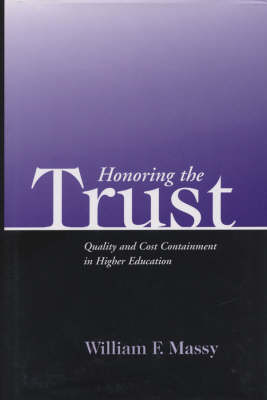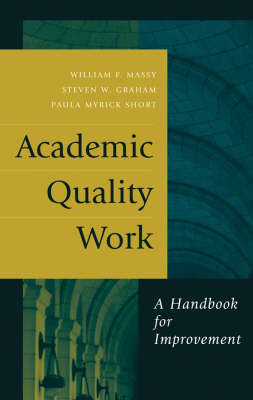JB - Anker
2 total works
How does higher education honor (or dishonor) the trust that society places in it? While colleges and universities may perform an adequate job of educating students, this book argues that institutions might still improve their competency while reining costs.In Honoring the Trust, the author examines how the environment of higher education and institutional policies has led to shortfalls in education competency. Rather than simply list the flaws in higher education, this book presents a practical program for improving the quality of higher education without increasing spending or sacrificing other priorities. Based on research performed at the National Center for Postsecondary Improvement, it provides a description of the problems that are currently facing institutions of higher education, and envisions solutions to these problems.
The book identifies major challenges facing institutions and faculty as they work to assure education quality, including:* The public's eroding trust in higher education* Education quality processes* Paradigm-changing technology* Cost consciousness* Core competency in education* Building awareness and commitments to improvement Written in engaging prose for readers ranging from seasoned academic leaders to concerned citizens outside of the academy, this book creates a venue for ongoing discussion and offers practical guidance to readers desirous of driving change in higher education.
The book identifies major challenges facing institutions and faculty as they work to assure education quality, including:* The public's eroding trust in higher education* Education quality processes* Paradigm-changing technology* Cost consciousness* Core competency in education* Building awareness and commitments to improvement Written in engaging prose for readers ranging from seasoned academic leaders to concerned citizens outside of the academy, this book creates a venue for ongoing discussion and offers practical guidance to readers desirous of driving change in higher education.
Academic Quality Work
by William F. Massy, Steven W. Graham, and Paula Myrick Short
Published 1 May 2007
The proposal for improving academic quality without spending more or abandoning other priorities, presented in 2003 in William Massy's Honoring the Trust, is extended and applied in this how-to book. Informed by successful applications of academic audit at the department level by the University of Missouri System and the Tennessee Board of Regents, this book offers tested descriptions of academic quality work and the audit process. It extends both to include research and teaching at community colleges and four-year campuses. The authors see audit as a way to jump-start and then reinforce a self-sustaining cycle of academic quality improvement. This approach, which is low cost and highly collegial, uses structured conversation within the department and between department members and auditors to examine the possibilities for improvement and achieve commitments for change. Academic Quality Work is aimed at change agents-provosts, deans, department chairs, academic senate members, and faculty-and sponsors of quality improvement, such as trustees, foundation leaders, and legislatures.
This book provides 1) the conceptual tools needed to apply audit in any academic setting, 2) materials for orientation and training, 3) examples of self-study and audit reports, and 4) testimonials from faculty.
This book provides 1) the conceptual tools needed to apply audit in any academic setting, 2) materials for orientation and training, 3) examples of self-study and audit reports, and 4) testimonials from faculty.

